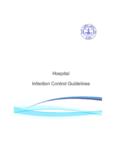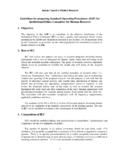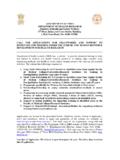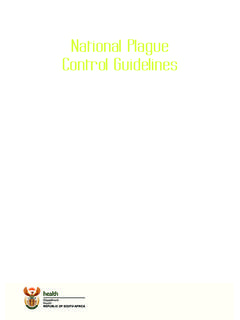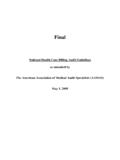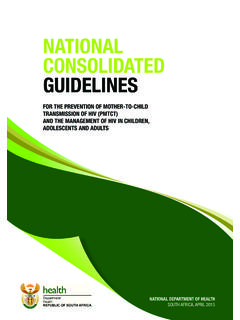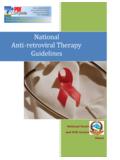Transcription of National Ethical Guidelines for Biomedical Research ...
1 National Ethical Guidelines for Biomedical Research Involving Children Indian Council of Medical Research2017 Disclaimer:Care has been taken to present the information accurately and inline with the latest government Guidelines . However, in view of ongoing changes in government regulations and the constant flow of new information, the reader is urged to check the latest notifications/rules/ regulations provided by the Government of India from time to time. Published by the Division of Publication and Information on behalf of the Secretary DHR & DG, ICMR, New Delhi. Printed at M/s Royal Offset Printers, A-89/1, Naraina Industrial Area, Phase-I, New Delhi-110028 Phone: 011-25797524,Compiled & Edited by:Dr. Reeta RasailyPublished by:Director GeneralIndian Council of Medical ResearchNew Delhi- 110029 October 2017 Production Controller:J. N. MathurICMR, New DelhiMessageIt is important to include children in clinical Research including clinical trials so that the benefit of new therapy can also be applied to children as soon as possible.
2 Traditionally children are often the last to benefit from advances in medicine. However, because of their inherent vulnerability the potential risk from participation in Research studies must be anticipated and adequate precautions taken. These Guidelines have been developed specifically to address Ethical issues of conducting Research in children. We hope that these guidelinesare put into practice in every institution conducting Research in children and the scientific community, public at large get immensely am grateful to Prof. and Dr. under whose stewardship these Guidelines were developed and all members of expert review committee who have contributed their time and ideas SwaminathanSecretary, DHR & DG, ICMRb . x l x S , i B E l + x v x M l A { B E h j A A b , A{ EAA , A{ EAx AA , A{ EAA A c x n B E, + < A + Dr.}}}}
3 Soumya SwaminathanMD, FASc, FNASc, FAMSS ecretary to the Government of IndiaDepartment of Health Research Ministry of Health & Family Welfare &Director-General, ICMRI ndian Council of Medical ResearchDepartment of Health Research Ministry of Health & Family WelfareV. Ramalingaswami Bhawan, Ansari Nagar New Delhi-110 029 (INDIA) l + x v x M l A { B E h j . M x , + x M x < n -110 029 ( i )Tele. : (Off.) +91- 11-26588204, 26589620 ; Fax (Off.) : +91-11-26588662, E-mail: are unique biologically and in their interphase with the environment. This is true in fetal life and throughout childhood. The findings in adults cannot be automatically assumed to be true in children. This applies to the way therapeutics and preventive modalities are taken up and metabolised.}
4 Children are vulnerable and carry a greater risk of harm during Research . Many new technologies that can provide cures for incurable disease also pose major Ethical concerns. In countries where effective literacy is still not common, we have a far greater responsibility to ensure that the participants and their care givers understand, with utmost clarity, the Research and procedures that researchers propose. Practice of the right kind requires norms and Guidelines that are articulated with sublime clarity. An institutional mechanism to administer and oversee Research practice is critical at an institutional level. Monitoring of data safety and quality through data monitoring committees compliments the work of the ethics committees. In modern Research privacy and confidentiality are important to preserve. Biological specimens must be obtained when the knowledge to be gained is likely to advance medical care, how these are used must have the explicit approval of the subjects of Research .
5 It is therefore, gratifying that the Indian Council of Medical Research , the nodal agency in the country has developed Ethical Guidelines for Biomedical Research involving children. These are written with clarity, based on scientific and Ethical principles, and balanced in providing guiding principles and processes and practices for achieving compliance with these with the Guidelines . As someone concerned with bringing the fruits of Research to our children as well as to ensure their safety and security, I complement the council for this outstanding contribution. It is for us, researchers to ensure that the guidance becomes the practice in every institution of the country. We need Research for children but only under the best Ethical MK BhanForewordIn this era of evidence based medicine, it is imperative to conduct robust and Ethical Research in neonates, infants, children and adolescents to improve our understanding of disease and provide optimal healthcare.
6 However, professionals and parents often feel apprehensive about asking this vulnerable population to take part in Research because of greater potential risks or burdens. Furthermore, young children are not in a position to make autonomous decisions regarding their participation in Research , which puts them at risk of coercion or undue is therefore mandatory that Biomedical Research involving children zealously protects their interests, especially from an Ethical perspective. Ethics could be considered as codified practices and procedures performed by the practitioners of the profession. Institutional Ethical Committees thus need to refer to consensus recommendations to arrive at meaningful decisions. Adult based Guidelines are not ideal for this purpose because special concerns related to children are usually not addressed in detail. Realising this felt need, several developed countries have formulated their ethics Guidelines for Biomedical Research involving children.
7 However, there is a need to adapt these recommendations to the Indian context to overcome challenges of applying universal Ethical principles in the multicultural Indian society with a diversity of health-care systems with varying 2006, the Indian Council of Medical Research developed an updated, third version entitled Ethical Guidelines for Biomedical Research on Human Participants . These Guidelines contain only a small section pertaining to Research in children, which does not address in detail several Ethical perspectives of conducting Biomedical Research in neonates and children. This monograph is intended to accomplish this important task and serve as the reference manual for Ethical committees in the National context. These consensus recommendations were formulated through a rigorous and robust methodology including review of pertinent National and international Guidelines , multiple stakeholders input and public scrutiny.
8 It is hoped that this timely publication will fulfil the objectives with which it was Sachdev,AcknowledgementFor the first time The Indian Council of Medical Research has come out with the Guidelines separately for Biomedical Research involving children. We acknowledge with gratitude the contributions made by ICMR Advance Center on Newborn Health Research at All India Institute of Medical Sciences under leadership of Professor Vinod Kumar Paul in creating the draft Guidelines for Biomedical Research involving children. We gratefully acknowledge contribution of Dr. Suvasini Sharma and Dr. Naveen Sankhyan for preparing the initial draft. We are indebted to all members of the core committee and members of expert group for their valuable contributions in finalizing the draft Guidelines . Special thanks to Dr. Vasantha Muthuswamy and Dr. Roli Mathur for their constant guidance and final editing of the draft are grateful to Secretary Department of Health Research and Director General ICMR Dr.
9 Soumya Swaminathan and Dr. Katoch (Former Secretary DHR & DG ICMR) for their continued support and gratefully acknowledge the contribution of Mr. Devesh Lodhy for designing the cover page and assistance of Mr. J. N. Mathur for final printing and publishing the Guidelines . Dr. SharmaScientist G & Head Div. of Division of RBMCH, ICMR, New DelhiDr. Reeta RasailyScientist F, Division of RBMCH, ICMR, New DelhiContentsAbbreviations Section 1 10 Introduction 10 Needs and challenges of clinical Research in children 11 Why is Biomedical Research necessary in children? 11 Challenges of Biomedical Research involving children 12 The process of developing ethics Guidelines for Research involving children 12 Scope of the Guidelines 13 General Guidelines for Research in children 14 Section 2: Risk 13 Assessment of benefit and risk in Research in children 15 Classification of Risks 16 Definitions.
10 16 Less than Minimal Risk 16 Minimal risk 16 Minor increase over minimal risk or Low risk 16 More than minimal risk or High risk 17 Concept of relative versus absolute interpretation of risk 17 Determinants of risk 17 Pain, distress, and fear minimization in children during Research 17 Type of assays and sample collection 18 Paediatric formulations to be used in paediatric studies 18 Guidelines for Ethical approval based on degree of risk 18 Section 3: Consent and Assent 19 Informed consent 19 General principles of informed consent 19 Waiver of consent 21 Concerns regarding informed consent 22 Children s assent 23 Age and method of obtaining assent 23 Waiver of assent 23 Content of assent forms 24 Section 4.
